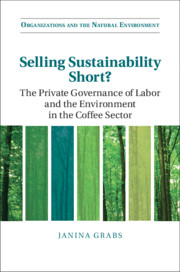 Selling Sustainability Short?
Selling Sustainability Short? Published online by Cambridge University Press: 28 April 2020
Chapter 2 constitutes the core theoretical chapter of the book. It serves two functions. First, it introduces the micro–institutional rational choice approach that is applied throughout the work. It explains why producers targeted by market-driven regulatory governance can be considered boundedly rational actors, what this characterization entails, and how institutional arrangements can help such actors to overcome collective action problems. It then shows how Kiser and Ostrom’s Three Worlds of Action can be leveraged to link institutional design choices to their outcomes. In a second step, Chapter 2 examines market-driven regulatory governance using this approach. It uncovers the institutional design dilemma that standards face as they scale up, and specifies a number of hypotheses on how these choices (e.g., between binding and flexible standard–setting; strict or flexible oversight mechanisms; and a focus on price premiums or on capacity building) will affect the implementation of standards by drawing on institutional rational choice theory as well as insights from the socio-legal literature.
To save this book to your Kindle, first ensure [email protected] is added to your Approved Personal Document E-mail List under your Personal Document Settings on the Manage Your Content and Devices page of your Amazon account. Then enter the ‘name’ part of your Kindle email address below. Find out more about saving to your Kindle.
Note you can select to save to either the @free.kindle.com or @kindle.com variations. ‘@free.kindle.com’ emails are free but can only be saved to your device when it is connected to wi-fi. ‘@kindle.com’ emails can be delivered even when you are not connected to wi-fi, but note that service fees apply.
Find out more about the Kindle Personal Document Service.
To save content items to your account, please confirm that you agree to abide by our usage policies. If this is the first time you use this feature, you will be asked to authorise Cambridge Core to connect with your account. Find out more about saving content to Dropbox.
To save content items to your account, please confirm that you agree to abide by our usage policies. If this is the first time you use this feature, you will be asked to authorise Cambridge Core to connect with your account. Find out more about saving content to Google Drive.